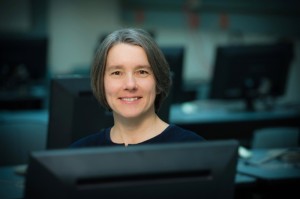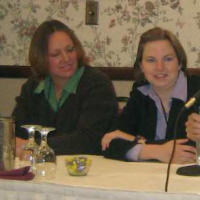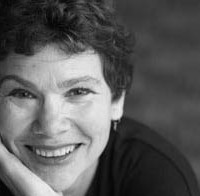Interview with Anne Condon
Originally Printed in Winter/Spring 2009 Newsletter
Anne Condon is a Professor of Computer Science and Associate Dean for Faculty Affairs and Strategic Initiatives at the University of British Columbia (UBC). She holds the NSERC/GM Canada Chair for Women in Science and En-gineering for the British Columbia region. Currently, Anne’s research focuses on computational prediction of RNA and DNA secondary structure, with applications to design of novel structures and gene synthesis. She is interested more broadly in working on fun theoretical problems that are motivated by practical applications, and has contributed to computational complexity theory, hardware verification, biomolecular computation, and combinatorial auctions. 
Q: Tell us about the research you are currently doing.
Right now, I’m fascinated by the way that DNA and RNA molecules can fold into complex structures. These molecules are sequences of four types of bases; the base sequences encode the folding pathway and structure formed by the molecules. My research aims to find accurate predictions of the structures formed from the base sequences, and ultimately to learn how to program molecules to form novel pathways and structures. Our work on RNA structure prediction draws on, and contributes to, the fields of biophysics, machine learning, and combinatorial algorithms.
Q: How has your research evolved over the years? And what does the future hold?
I’ve always liked theoretical work, particularly complexity theory. But I also enjoy the opportunity to work in collaboration with researchers in more applied areas, when I can provide insights that have practical relevance. More and more, when I’m interested in a problem, I try to look very broadly for the right approaches and find the right collaborators. I think that the emerging field of molecular programming will provide a rich domain of theoretical and applied problems for a long time to come.
Q: What are some of the joys and challenges of doing interdisciplinary research?
Hmm… learning about exciting developments in many fields, and working with people who have different domains of expertise are definitely some of the joys. I’m always amazed how the core expertise I have in theoretical computer science is so broadly relevant. A challenge I enjoy is to figure out what are really compelling problems, where I have something distinctive to contribute and which are also important in the other discipline. Getting enough funding is a less enjoyable challenge!
Q: What does it mean to be an NSERC Chair? What is the Jade project?
NSERC is the primary federal funding agency for science and engineering in Canada, comparable to NSF in the U.S. The NSERC Chairs for Women in Science and Engineering have a mandate to increase the participation and success of women in science and engineering. There are five regional chairs; I’m the chair for British Columbia and the Yukon. The Jade project encompasses the ways in which I try to achieve the mandate of the Chairs program. Components of the Jade project have included work on an CS100 course, “Connecting with Computing”, which uses an interdisciplinary approach to convey fundamental CS concepts, and building a network of engaged project leaders at institutions across the province (inspired by CRA-W).
Q: You are doing a stint in administration in your Associate Dean role. How did this come about? What has this allowed you to accomplish?
A few years ago, I helped conduct an assessment of the working climate in the Faculty of Science at UBC, modeled on similar studies at MIT and elsewhere. The assessment was highly praised by our dean, Simon Peacock, and he asked me to help implement the resulting recommendations. It’s been an incredible opportunity so far. I would bet that UBC Science may now have the best policies to be found anywhere in North America, in terms of helping new parents who are faculty members maintain momentum in their research– with flexible options that provide full teaching reduction for up to a year after birth or adoption of a child, as well as funding to help defray research costs and to cover childcare costs when traveling to a conference or a field trip. We are also adapting practices of NSF ADVANCE programs, with respect to faculty recruiting and mentoring.
Q: What advice would you give to Mid Career professors who might be considering administration?
If you have a chance to work with great people, and make a difference in areas you care about, go for it! Build a net-work of people who can help you stay focused on your goals, and determine what resources you need for the job. Be a good listener and respect the people you work with. Don’t be afraid to make mistakes. Always set aside time for the other important things in your life, and to recharge.
Q: How have you been and continue to be involved in CRA-W?
When I started on CRA-W, I did not realize how empowering it would be to work with such a committed and accomplished group of women. I’m glad to have contributed to several CRA-W projects over the years, starting with the DMP. I nudged CRA-W to extend their programs to Canada, when I moved here in 1999. I’m currently using Jade project funding to support CRA’s Canadian Distributed Mentor project (Archived Project), which has been coordinated by Professor Faith Ellen (U. Toronto). I also especially look forward to the Graduate Cohort workshops, because of the great energy of participants! I hope to stay involved, because I think CRA-W’s programs are great and because of the benefits to me in terms of friendships and personal growth.
Q: What do you enjoy most about your career right now?
I enjoy the fact that every single thing I’m working on is important to me, and that I’m supported by those around me in my goals. What could be better?
Q: How do you balance work and family?
Living in a beautiful location helps. We live within walking distance of beaches and forest – as well as wonderful food and amenities. I can bicycle to my office on the UBC campus in 15 minutes or so. My husband Scott and I very much enjoy having more time to do things together, now that our kids are teenagers. We try to keep things simple– most weeks I need only use the car on weekends, to go t0 my son Emil’s soccer games or run errands. Housework still mostly gets ignored! Staying close to family also means taking advantage of travel to see my parents, sisters, and relatives in Ireland, and my in-laws in Ohio. Sometimes I stop in Ireland en route to conferences and sometimes my parents meet me wherever I am going in Europe. It’s refreshing to be away from the North American pace of life. My daughter Fiona is now at Brown University, not far from another sister of mine who lives outside of Boston, so I’m hoping to visit there more often in the next few years.
Anne Condon is a member emeriti of CRA-W and has served in many capacities on the Committee. She continues to be involved in CRA-W projects.






